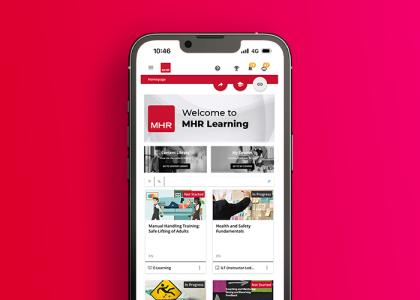Your workplace needs more WOW. Get ready for MHR's World of Work 2026
The future of learning: Identifying your LMS requirements

Does your organisation need an LMS? What next steps do you need to take?
In this digital age, learning has moved online and with it there are multiple learning platforms competing for your time and attention.
Following the pandemic, organisations were thrown five to ten years into a digital learning era – not only for delivery but also for tracking and reporting. This left many in the dark, leading them to question:
- Do we need a learning platform?
- Is our current learning platform suiting our LMS requirements?
- Can we consolidate our current supply and processes?
- How will we choose a system fit to serve the organisation’s needs?
- Which platforms can help make learning instant and personalised?
- What can be made available on handheld devices and adapted for accessibility needs?
How to figure out your LMS requirements
MHR Learning’s specialists offer some expert advice and guidance on how to make this process easier to digest.
Engage your stakeholders
Do this as early as possible. They should be drawn from every area of the business that will need something from the LMS – whether that’s HR, health and safety or learning and development. Try to first consider what everybody needs from a system before scouring the marketplace. Think of every group or individual that could torpedo the new system and get their input and genuine buy-in.
Define your needs
Outline the limitations of the current processes and what you need to overcome. These will become the driving force behind any decision-making. Key questions to consider include:
- Do we need to migrate current data across?
- Do we need any additional content?
- How are we going to deliver the training? E-learning, virtual instructor led etc?
- Can the system accommodate blended learning?
- How many users will be accessing the platform?
- What about integration to key line of business systems e.g. HRIS (human resource information system) etc?
Reporting will be key to ensure you have an over-arching view of completed and outstanding learning across the business. Is the candidate system proficient in this area? Does it also account for talent management?
Map your end user experience
What should this look like?
While you will be rightly concerned with ensuring the all-important need for driving compliance and reporting/tracking adoption, for most users the only important LMS requirements are usability and structure. You should look for a system that combines both the functional needs of the organisation while at the same time has the aesthetics to appeal to end users.
Also, understand who the ‘end user’ is. Is it internal staff? Is it contractors? What are their needs when it comes to learning? Will they mainly be required to learn virtually or through Instructor led training (ILT’s)? Will you need views to suit different audiences? What about mobile learning?
Set clear timescales and outline your approach
We always recommend a structured approach to the implementation of any new system. Utilise the knowledge and experience of your enablement consultants. Give them clear instructions about your LMS requirements and they will deliver. Be sure to make deadlines feasible. A rushed roll-out is more likely to cause further problems down the line.
Consider a soft launch or phased roll-out to iron out anything you may not have considered during the initial scoping phase. This will also give you the opportunity to engage with your end users to gather feedback on the system. Make sure the right people are in the room in order to pass on key knowledge of the system to users post-Go Live. Utilise the support on offer.
At MHR when implementing an LMS…
We begin with a scoping session to establish your LMS requirements, map learning outcomes to the build process, and follow this up with regular check-ins for all stakeholders to ensure the system build adheres to the brief. Testing is essential too. We recommend a rolling Acceptance Testing (UAT) period which is beneficial for flushing out bugs while also ensuring your knowledge of the system is second-to-none to support end user adoption. You cannot underestimate the value of genuine buy-in. We’re always pleased to discuss LMS needs with our customers and the wider market. Feel free to contact us.



